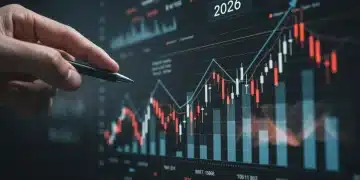Economic news highlighting growth in sustainable industries

The future of jobs in sustainable industries is promising, with growth in renewable energy, innovative technologies, and sustainability roles, driven by increasing demand for eco-friendly practices and supportive government policies.
Economic news highlighting growth in sustainable industries points to a compelling shift in how businesses are evolving. Looking closely, we can see how sustainability isn’t just a trend; it’s becoming a crucial part of economic development. What does this mean for us?
Current trends in sustainable industries
Understanding the current trends in sustainable industries is crucial for both businesses and consumers. Many companies are now pivoting towards environmentally friendly practices, influencing their markets significantly.
Shift Towards Renewable Energy
There has been a major shift towards renewable energy sources like solar and wind power. This move is not only beneficial for the environment but also presents investment opportunities.
Increased Consumer Demand
Consumers are leaning towards sustainable products, influencing companies to adapt. Customers want to support brands that align with their values, making it essential for businesses to focus on sustainability.
- Eco-friendly packaging is winning over traditional options.
- Brands showcasing transparency in sourcing gain consumer trust.
- Sustainable fashion is becoming a leading trend with more brands adopting circular models.
This growing preference for sustainability is pushing companies to innovate. By implementing green practices, businesses not only reduce their carbon footprint but also attract a loyal customer base.
Another trend is the integration of technology, such as artificial intelligence. Companies are using technology to optimize operations and reduce waste efficiently, which is a key factor in the growth of sustainable industries.
Furthermore, government regulations are fostering an environment where sustainability thrives. Policies encouraging green initiatives are shaping the business landscape, allowing for more support for eco-friendly practices.
Overall, these trends highlight a significant transformation in the market dynamics, emphasizing the importance of adapting to sustainable practices.
Key players driving growth
Identifying the key players driving growth in sustainable industries helps us understand the market better. These companies are not just leading the charge; they are redefining how business is done.
Innovative Startups
Many startups are emerging in the sustainable space, bringing fresh ideas and innovations. They focus on solutions to minimize waste and enhance efficiency. Their agility allows them to adapt quickly, setting new trends.
- Startups focused on biodegradable materials.
- Companies innovating in clean energy technologies.
- Firms specializing in sustainable agriculture practices.
Established companies are also redefining their strategies. Major corporations are investing heavily in sustainable practices, recognizing the long-term benefits. By shifting towards environmentally friendly operations, they appeal to a growing number of eco-conscious consumers.
Corporate Sustainability Initiatives
Organizations like Unilever and Microsoft are making significant strides. They commit to reducing carbon footprints and integrating sustainability into their business models. Such initiatives not only enhance brand loyalty but also pave the way for operational cost savings.
Partnerships between large corporations and innovative startups create a powerful dynamic. These collaborations facilitate knowledge sharing and resource pooling, driving rapid advancements in sustainability.
Furthermore, government and non-profit organizations play a crucial role in fostering an environment where these key players can thrive. Supportive policies and initiatives encourage investment and innovation within the sustainable industries.
Innovative technologies in sustainability

Innovative technologies in sustainability are reshaping how we approach environmental challenges. These advancements are not just theoretical; they are practical solutions driving real change.
Clean Energy Solutions
One of the most impactful areas is clean energy. Technologies such as solar panels and wind turbines harness natural resources to generate electricity without harmful emissions. This shift reduces reliance on fossil fuels.
- Solar energy systems are becoming more affordable and efficient.
- Wind farms are generating power on a larger scale than ever.
- Hydroelectric plants provide a consistent energy source.
Next, we see advances in energy storage. Batteries are crucial for managing energy produced from renewable sources. Stronger, more efficient batteries help store energy for use on demand, solving the intermittency issue.
Waste Management Innovations
Technology also plays a vital role in waste management. Smart waste management systems can optimize collection routes and schedules based on real-time data. This not only saves fuel but also limits emissions from waste collection vehicles.
Recycling technologies are evolving, with enhanced methods for sorting and processing materials. For example, advanced sorting systems use AI to identify recyclables more accurately, increasing recycling rates.
Water purification technologies are also making waves. Innovative methods are being developed to treat wastewater more effectively, turning it into clean, reusable water. This has significant implications for areas facing water scarcity.
Overall, these technologies create a pathway for businesses and communities to operate sustainably while reducing their environmental impact. By embracing these innovations, we can work towards a greener future.
Government policies supporting green initiatives
Government policies supporting green initiatives play a critical role in promoting sustainability. These policies are designed to encourage businesses and individuals to adopt eco-friendly practices and technologies.
Incentives for Renewable Energy
Many governments offer tax credits and subsidies for renewable energy projects. These incentives help make solar panels, wind turbines, and other clean technologies more affordable for consumers and businesses.
- Tax deductions for installing solar energy systems.
- Subsidies for wind energy development.
- Grants for research in sustainable technologies.
By providing financial support, governments remove barriers and encourage more people to invest in renewable energy sources.
Regulations Promoting Sustainability
Regulations are also important. Laws that limit greenhouse gas emissions compel industries to rethink their operations. Many companies are investing in cleaner technologies to comply with these regulations.
For example, stricter emissions standards for vehicles lead to advances in electric and hybrid car technology. Such regulations push manufacturers to innovate and develop greener products.
Governments can also promote public transport systems, reducing reliance on personal vehicles. Investments in bike lanes and public transit improve accessibility while lowering carbon footprints.
Overall, effective government policies create the framework for a more sustainable future. By supporting clean energy projects and enforcing environmental standards, they facilitate a shift towards greener practices.
The future of jobs in sustainable industries
The future of jobs in sustainable industries is looking bright. As more companies adopt eco-friendly practices, new job opportunities are emerging across various sectors.
Growth in Renewable Energy Jobs
One of the most notable areas is renewable energy. Jobs in this sector are expected to grow significantly as the world shifts towards clean energy sources. The demand for solar panel installers and wind turbine technicians is rising rapidly.
- Solar energy installation teams are needed for residential and commercial projects.
- Wind energy maintenance crews are essential to keep turbines operational.
- Research and development roles are expanding in energy efficiency technologies.
These positions offer competitive salaries and long-term career paths, appealing to many workers.
New Roles in Sustainability
Aside from traditional roles, innovative positions are surfacing. Companies are hiring sustainability officers and consultants to guide their green initiatives. These professionals ensure compliance with environmental regulations while fostering a culture of sustainability.
Another exciting development is in sustainable agriculture. As organic farming gains popularity, jobs in this field are growing. Roles include agricultural scientists, farm managers, and sustainable resource specialists. These jobs focus on producing food in harmony with the environment.
Moreover, the tech industry is also stepping up, creating jobs in environmental technology. Software developers are working on solutions that help organizations track their carbon footprints and optimize resources.
The shift towards sustainability not only creates new job opportunities but also transforms existing roles. Workers are acquiring skills that emphasize environmental responsibility, making their jobs more relevant in a changing world.
FAQ – Frequently Asked Questions about Jobs in Sustainable Industries
What types of jobs are growing in sustainable industries?
Jobs in renewable energy, sustainable agriculture, and environmental technology are rapidly increasing as the world focuses on sustainability.
How can I prepare for a career in a sustainable field?
Gaining skills in renewable energy technologies, sustainability practices, or environmental science can position you well for a career in these industries.
What is the impact of government policies on job growth in sustainability?
Government incentives and regulations encourage businesses to adopt sustainable practices, leading to more job opportunities in those sectors.
Are the jobs in sustainable industries well-paying?
Many jobs in sustainable industries offer competitive salaries, reflecting the demand for skilled workers who can contribute to eco-friendly solutions.





